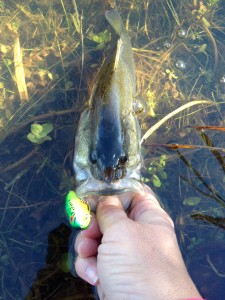7 Tricks to Try On a Fishing Trip When The Fish Won't Bite
By Debbie Hanson
Jul 07, 2015
You have the entire family together, you've gone through your checklist of tackle, fueled up the boat, and made your way out to your favorite fishing hole.
You have the entire family together, you've gone through your checklist of tackle, fueled up the boat, and made your way out to your favorite fishing hole. You have high hopes for a successful fishing trip, but when an hour goes by without a single bite, you begin to realize that you're going to have to pull a few fishing tricks out of your sleeve pretty quickly before everyone starts to get impatient.
If you're wondering which tricks to try, you might want to start with one of the seven that I've listed below. Sometimes just a simple adjustment or change of tackle can turn yawns into joyous squeals of delight.
-
Chum. Both freshwater and saltwater anglers can try to chum when the fish aren't biting. To make chum, you can use dead minnows or baitfish, add a can or two of cat food, and blend the ingredients together. Put the mixture inside of a mesh chum bag and allow it to disperse around your fishing area. Cast your line out again once the chum starts to disperse and starts attracting small fish. The small fish will attract larger gamefish.
-
Downsize your leader line. Your leader could be too heavy given the water clarity or conditions and it may be visible to the fish. Try downsizing your leader to a lighter weight, and then see if you start getting a few bites.
-
Downsize your hooks. You may also want to try downsizing the size of your hooks and bait if you aren't getting any bites. Your hook and bait should be as easy as possible for the fish to bite, so consider the size of your target species and whether or not you may be using hooks and bait that are too large.
-
Check to be sure you are fishing an area where there is structure. This may seem obvious, but if you're on a fishing trip and there is a lack of action, check to make sure you haven't drifted away from a spot where there is structure. Use your fish finder or a contour map to find the best places to boat and fish.
-
Vary your retrieve. Depending on water temperature and conditions, you may have to vary your retrieve in order to elicit a bite. For example, when I am bass fishing during the hot summer months in Florida, I know that the bass are more sluggish and I'll have to work my lures slower in order to get a bite.
-
Switch depths. Move to deeper water if you aren't catching fish in shallower water. Switch to shallower water if you are fishing deep water and aren't catching fish.
-
Try the one lure in your tackle box that you’ve never used. I think every angler I know has a few lures that are still in an unopened package at the bottom of our tackle boxes. Each time we go out, we intend to try it, but end up sticking to our same old favorites instead. Well, now is the time to change it up and see if that one lure you haven't yet tried might work.

Now that you know about a few tricks you can try when the fishing is slow, be sure to review your state fishing regulations to make sure you have the most up-to-date information about seasons, size limits and bag limits.









